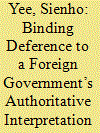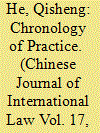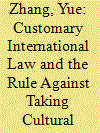|
|
|
Sort Order |
|
|
|
Items / Page
|
|
|
|
|
|
|
| Srl | Item |
| 1 |
ID:
170435


|
|
|
|
|
| Summary/Abstract |
This amicus brief for China Chamber of International Commerce was filed on 4 April 2018 in Animal Science Products, Inc. v. Hebei Welcome Pharmaceutical Co., No. 16-1220 in the US Supreme Court, which was decided on 14 June 2018. The brief argues that: I. Rule 44.1 of the US Federal Rules of Civil Procedure addresses only what materials may be used in determining foreign law, not what effect to give to these materials, which effect must be determined on considerations outside the Rule, and is consistent with whatever effect properly derived, including “binding deference”; II. A distinction must be made, among the materials used to determine foreign law, between what may count as applicable law and the subsidiary means for determining applicable law, and the interpretation or characterization of Chinese trade law by MOFCOM counts as applicable law; III. The Pink precedent demands that binding deference be given to the interpretation or characterization of Chinese trade law by MOFCOM as the authoritative decision-maker in this area; IV. The act of state doctrine as reflected in Sabbatino also supports binding deference to the interpretation or characterization of Chinese trade law by MOFCOM as the authoritative decision-maker in this area; V. Alternatively and subsidiarily, the interpretation or characterization of Chinese trade law by MOFCOM as the highest administrative authority on trade law in China should be given substantial deference analogous to Chevron deference; and VI. The alleged inconsistency between China’s representations to the WTO and its position in this case, even assumed to exist, does not affect the validity of its position in this case as a matter of domestic law and therefore the binding deference due to it.
|
|
|
|
|
|
|
|
|
|
|
|
|
|
|
|
| 2 |
ID:
170436


|
|
|
|
|
| Summary/Abstract |
This Survey covers materials reflecting Chinese practice in 2017 relating to: treaties, agreements and other documents signed or ratified by the People’s Republic of China; national legislation; statements made by Chinese representatives at the meetings of the UN and other international organizations, international conferences, and those made by the Foreign Ministry spokespersons, with respect to various branches of international law; and judicial decisions, in particular on the applicability and application of international conventions, by Chinese courts
|
|
|
|
|
|
|
|
|
|
|
|
|
|
|
|
| 3 |
ID:
170437


|
|
|
|
|
| Summary/Abstract |
This survey contains materials reflecting the practice of Chinese private international law in 2017. First, the statistics of the foreign-related civil or commercial cases accepted and decided by Chinese courts is extracted from the reports of the Supreme People’s Court (SPC), released in 2018, most notably the Report on the Work of the SPC in 2017. Second, two judicial interpretations of the SPC that took effect in 2017 are translated, i.e., the Provisions of the SPC on Issues Concerning Report and Approval of Cases Requiring Judicial Review of Arbitration and the Provisions of the SPC on Several Issues Concerning Trial of Cases Requiring Judicial Review of Arbitration. These two instruments contain provisions reflecting a pro-arbitration tendency in Chinese courts. Another document, the Nanning Statement of the Second China-ASEAN Justice Forum, is also introduced. It contains a commitment to judicial assistance cooperation, especially improvement of mutual recognition and enforcement of judgments. Third, since China signed The Hague Convention on Choice of Court Agreements in 2017, but has not yet ratified it, one case selected in this paper cites the Convention as a reference in its assessment of the exclusivity of the applicable choice of court clause. Fourth, three representative cases with regard to independent guarantee, letter of credit and financial loan contract are examined. These cases from the SPC shed light on the independence principle of the guarantee and the credit, as well as the strict compliance principle. Fifth, three typical cases decided by various Chinese courts during 2017 are introduced. These cases involve issues relating to the law applicable to construction contracts and land contracts, as well as property relationships between spouses. As for the application of international conventions, two separate cases involving the application of the CISG and the Montreal Convention are reviewed. Finally, the paper examines three cases with different or inconsistent practices regarding reciprocity and other issues, given recent increases in the recognition and enforcement of monetary judgments by Chinese courts. In this regard, a unified practice is required in Chinese courts.
|
|
|
|
|
|
|
|
|
|
|
|
|
|
|
|
| 4 |
ID:
170433


|
|
|
|
|
| Summary/Abstract |
Many countries seek to regain lost cultural property that was taken as spoils of war during the nineteenth and early twentieth centuries. Some scholars, however, regard such claims as baseless in public international law of this period. This article carries out an intertemporal law analysis and argues that the rule against such plunder was indeed founded in the laws and customs of war in the eighteenth century, became well established in the nineteenth century, and further developed in the twentieth century. If the plundered works exist and are identifiable, restitution is the only remedy for violation of this rule. This article aims to provide the legal grounds for restitution claims and thus provide the first steps for victim States to regain their lost cultural property.
|
|
|
|
|
|
|
|
|
|
|
|
|
|
|
|
| 5 |
ID:
170432


|
|
|
|
|
| Summary/Abstract |
Differences between various theories of human rights have so far been mainly those of within the same Western worldview, which has either ignored other viewpoints or treated them with condescension. To avoid abstract theorizing on the nature of human rights without studying concrete societies, which had previously existed or exist today, without the analysis of why some of them had become slave-owning societies while others had evolved into liberal-democracies, it is necessary to take historical and comparative approaches. Historically the emergence of human rights is related to the advent of centralized States in the Medieval Europe where those belonging to the class of nobles needed tools that would have justified their claims against the king becoming all-powerful. Both, human rights expressing the good that exists in humans, and human wrongs, reflecting the evil existing in the world and in us, are both equally human, though not necessarily humane. Human rights are social constructs that are called upon to respond to human needs and help remedy human wrongs. Some human rights may, indeed, become universal (namely, become universal, not to be such as God given or deriving from something called human nature), others may be universalisable, while the domain of application of certain rights may remain relatively restricted. While human beings, in essence (i.e. not superficially, as to the colour of their skin or slant of their eyes), are very much the same, societies differ hugely. Societal and cultural differences acquired during the tens of thousands of years long journey of the Homo Sapiens from an African village to all over the world cannot be overcome within decades or even centuries, if ever. There is no global village in the horizon and the world has not become flat.
|
|
|
|
|
|
|
|
|
|
|
|
|
|
|
|
| 6 |
ID:
170434


|
|
|
|
|
| Summary/Abstract |
In Animal Science Products, Inc., et al. v. Hebei Welcome Pharmaceutical Co. Ltd., et al, the Supreme Court of the United States vacated the decision below, casting a shadow on the future of four vitamin C manufacturers in China. This case could be crucial for Chinese or other foreign enterprises which seek the protection of the “act of State doctrine” and/or other exemptions concerning the interpretation of their domestic law in U.S. courts. Among others, one of the profound implications of this case is that it will not be as simple for foreign parties to prove the effects of domestic law on their business practices from now on.
|
|
|
|
|
|
|
|
|
|
|
|
|
|
|
|
|
|
|
|
|